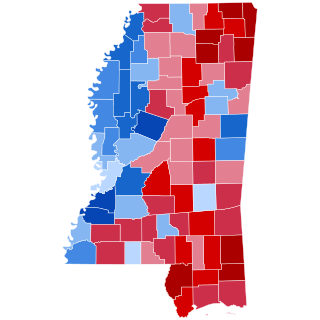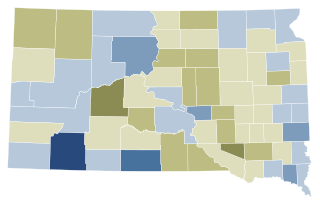In the politics of the United States, the process of initiatives and referendums allow citizens of many U.S. states to place legislation on the ballot for a referendum or popular vote, either enacting new legislation, or voting down existing legislation. Citizens, or an organization, might start an initiative to gather a predetermined number of signatures to qualify the measure for the ballot. The measure is placed on the ballot for the referendum, or actual vote.

Colorado Amendment 64 was a successful popular initiative ballot measure to amend the Constitution of the State of Colorado, outlining a statewide drug policy for cannabis. The measure passed on November 6, 2012, and along with a similar measure in Washington state, marked "an electoral first not only for America but for the world."

Cannabis in South Dakota is legal for medical use as of July 1, 2021, having been legalized by a ballot initiative on November 3, 2020. Prior to then, cannabis was fully illegal, with South Dakota being the only U.S. state which outlawed ingestion of controlled substances. Testing positive for cannabis can be a misdemeanor offense. South Dakota would have become the first state in US history to legalize recreational and medical cannabis simultaneously, but an amendment legalizing recreational marijuana that was approved in the same election was struck down as unconstitutional the following February. The challenge claimed the amendment violated Amendment Z, the "Single-Subject Rule". The decision was appealed to the South Dakota Supreme Court, which upheld the lower court's decision on November 24, 2021.

In the US state of Montana, cannabis has been legal for both medical and recreational use since January 1, 2021, when Initiative 190 went into effect. Prior to the November 2020 initiative, marijuana was illegal for recreational use starting in 1929. Medical cannabis was legalized by ballot initiative in 2004. The Montana Legislature passed a repeal to tighten Montana Medical Marijuana (MMJ) laws which were never approved by the governor. However, with the new provisions, providers could not service more than three patients. In November 2016 Bill I-182 was passed, revising the 2004 law and allowing providers to service more than three patients. In May 2023, numerous further bills on cannabis legalization and other related purposes passed the Montana Legislature. The Governor of Montana is yet to either sign or veto the bill.

Cannabis in Arkansas is illegal for recreational use. First-time possession of up to four ounces (110 g) is punished with a fine of up to $2,500, imprisonment of up to a year, and a mandatory six month driver's license suspension. Medical use was legalized in 2016 by way of a ballot measure to amend the state constitution.

The 2020 United States elections were held on Tuesday, November 3, 2020. The Democratic Party's nominee, former vice president Joe Biden, defeated incumbent Republican president Donald Trump in the presidential election. Despite losing seats in the House of Representatives, Democrats retained control of the House and gained control of the Senate. As a result, the Democrats obtained a government trifecta, the first time since the elections in 2008 that the party gained unified control of Congress and the presidency. With Trump losing his bid for re-election, he became the first defeated incumbent president to have overseen his party lose the presidency and control of both the House and the Senate since Herbert Hoover in 1932. This was the first time since 1980 that either chamber of Congress flipped partisan control in a presidential year, and the first time Democrats did so since 1948.

The Adult Use of Marijuana Act (AUMA) was a 2016 voter initiative to legalize cannabis in California. The full name is the Control, Regulate and Tax Adult Use of Marijuana Act. The initiative passed with 57% voter approval and became law on November 9, 2016, leading to recreational cannabis sales in California by January 2018.

The Florida Medical Marijuana Legalization Initiative, also known as Amendment 2, was approved by voters in the Tuesday, November 8, 2016, general election in the State of Florida. The bill required a super-majority vote to pass, with at least 60% of voters voting for support of a state constitutional amendment. Florida already had a medical marijuana law in place, but only for those who are terminally ill and with less than a year left to live. The goal of Amendment 2 is to alleviate those suffering from these medical conditions: cancer, epilepsy, glaucoma, positive status for human immunodeficiency virus (HIV), acquired immune deficiency syndrome (AIDS), post-traumatic stress disorder (PTSD), amyotrophic lateral sclerosis (ALS), Crohn's disease, Parkinson's disease, multiple sclerosis, chronic nonmalignant pain caused by a qualifying medical condition or that originates from a qualified medical condition or other debilitating medical conditions comparable to those listed. Under Amendment 2, the medical marijuana will be given to the patient if the physician believes that the medical use of marijuana would likely outweigh the potential health risks for a patient. Smoking the medication was not allowed under a statute passed by the Florida State Legislature, however this ban was struck down by Leon County Circuit Court Judge Karen Gievers on May 25, 2018.

Cannabis in Arizona is legal for recreational use. A 2020 initiative to legalize recreational use passed with 60% of the vote. Possession and cultivation of recreational cannabis became legal on November 30, 2020, with the first state-licensed sales occurring on January 22, 2021.

Cannabis in Mississippi is legal for medical use and illegal for non-medical use. Possession of small amounts was decriminalized in 1978.

The California state elections in 2020 were held on Tuesday, November 3, 2020. Unlike previous election cycles, the primary elections were held on Super Tuesday, March 3, 2020.

The 2020 United States presidential election in Mississippi was held on Tuesday, November 3, 2020, as part of the 2020 United States presidential election in which all 50 states plus the District of Columbia participated. Mississippi voters chose electors to represent them in the Electoral College via a popular vote, pitting the Republican Party's nominee, incumbent President Donald Trump, and running mate Vice President Mike Pence against Democratic Party nominee, former Vice President Joe Biden, and his running mate California Senator Kamala Harris. Mississippi has six electoral votes in the Electoral College.

A general election in the state of Montana was held on Tuesday, November 3, 2020, with the primary elections being held on June 2, 2020. Voters will elect one member to United States House of Representatives and all five state constitutional offices, among other elected offices.

South Dakota Initiated Measure 26 was a 2020 voter initiative to legalize medical cannabis in the U.S. state of South Dakota. The initiative was certified by the South Dakota Secretary of State for the 2020 ballot on December 19, 2019. The sponsor of the initiative was New Approach South Dakota, a volunteer group headed by Melissa Mentele. The group had unsuccessfully tried to get an initiative on the 2018 ballot. Polling in September 2020 indicated 70% voter support for the initiative.

Montana I-190, the Montana Marijuana Legalization and Tax Initiative was a cannabis legalization initiative that appeared on the November 3, 2020 Montana general election ballot. Passing with 57% approval, the initiative legalized recreational marijuana in the state effective January 1, 2021. Along with Arizona, New Jersey and South Dakota, Montana was one of four states that legalized cannabis via ballot measures in the November 2020 election.

Arizona Proposition 207 was a voter initiative that appeared on the November 3, 2020, Arizona general election ballot to legalize cannabis for recreational use. Passing with 60% of the vote, the initiative legalized the possession of up to an ounce of cannabis, licensed sales at dispensaries, and personal cultivation of up to six plants. Along with Montana, New Jersey and South Dakota, Arizona is one of four states that legalized recreational marijuana via ballot measures in 2020.

South Dakota state elections in 2020 were held on Tuesday, November 3, 2020. Its primary elections were held on June 2, 2020.

South Dakota Constitutional Amendment A, the Marijuana Legalization Initiative, was a cannabis legalization initiative that appeared on the November 3, 2020 South Dakota general election ballot. Passing with 54% of the vote, the measure would have legalized recreational marijuana in South Dakota effective July 1, 2021. Additionally, Amendment A required the South Dakota State Legislature to establish a medical marijuana program and legal hemp sales by April 1, 2022.

A general election was held in the U.S. state of Arkansas on November 8, 2022. All of Arkansas' executive officers were up for election as well as all four of the state's seats in the United States House of Representatives and a U.S. senator. Primaries were held on May 24, 2022, with runoff primaries on June 21. Polls were open from 7:30 AM to 7:30 PM CST.















